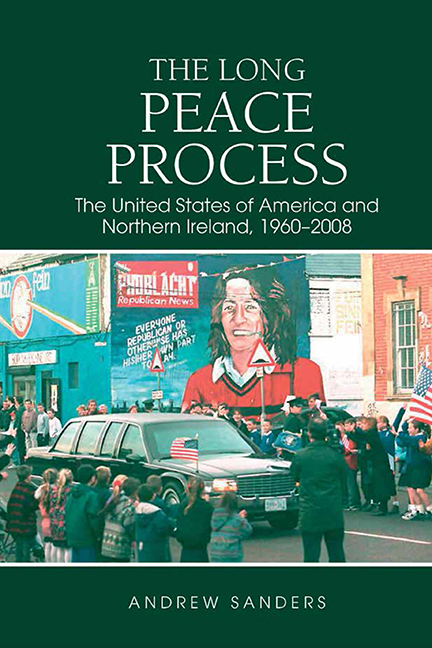Book contents
- Frontmatter
- Contents
- List of Abbreviations
- Acknowledgements
- Introduction
- 1 The USA and Ireland before 1968
- 2 The Early Years of the ‘Troubles’
- 3 Jimmy Carter and the Presidential Statement on Northern Ireland
- 4 Thatcher, Reagan, and Northern Ireland
- 5 The Bush Administration and Northern Ireland as a Local Political Issue
- 6 Bill Clinton and the Path to Good Friday
- 7 George W. Bush, Barack Obama, and Post-Conflict Northern Ireland
- Conclusion
- Select Bibliography
- Index
5 - The Bush Administration and Northern Ireland as a Local Political Issue
- Frontmatter
- Contents
- List of Abbreviations
- Acknowledgements
- Introduction
- 1 The USA and Ireland before 1968
- 2 The Early Years of the ‘Troubles’
- 3 Jimmy Carter and the Presidential Statement on Northern Ireland
- 4 Thatcher, Reagan, and Northern Ireland
- 5 The Bush Administration and Northern Ireland as a Local Political Issue
- 6 Bill Clinton and the Path to Good Friday
- 7 George W. Bush, Barack Obama, and Post-Conflict Northern Ireland
- Conclusion
- Select Bibliography
- Index
Summary
What does President Bush have to fear from the debate and dialogue of Gerry Adams? Could it be he is afraid Irish-Americans will be angered over U.S. indifference and collaboration and its terrible cost?
Irish Northern Aid ‘America's Irish War’ (undated)The 1988 Democratic National Convention saw Arkansas Governor Bill Clinton deliver the nomination speech for Michael Dukakis, the party's candidate for the 1988 Presidential election. The speech was not well received; accounts from the time recorded the highlight of the speech being when Clinton said, ‘in closing …’. Clinton would, only four years later, offer a strong line on Ireland as part of his Presidential campaign but Irish issues lacked resonance in national affairs and consequently played little role in the 1988 Presidential election. Where both the Italian-American Foundation and the Jewish Anti-Defamation League could secure both Presidential candidates at events, only Dukakis attended the Irish American Presidential Forum in New York in April. Dukakis pledged to press for Irish issues and offered his support to the International Fund for Ireland and the MacBride Principles.
The issue of the MacBride Principles had featured during campaigning ahead of the election. These were nine fair employment principles devised by the former Irish Minister for External Affairs, and a veteran republican, Sean MacBride, in 1984, and proposed as the corporate code of conduct for US companies doing business in Northern Ireland. During the 1988 Presidential election, both candidates supported the principles. Bush argued that: ‘I believe that job discrimination must cease. I do not think that they alone will solve the problem … if the Irish can bring about certainty, predictability and safety to themselves, then the climate for investment both foreign and domestic will be greatly improved’. Dukakis also stated his support, though not going as far as Reverend Jesse Jackson, another contender for the Democratic Party nomination, who pledged to sign them into law.
Bush's victory in the 1988 Presidential election was well received in Downing Street, understandably so given that it provided continuity with the Reagan administration and predictability to Anglo-American relations for the subsequent four years. Robin Renwick reported that the Prime Minister had ‘breathed a sigh of relief’ when Bush was elected, even though Bush, along with his Secretary of State James Baker, tended to view Germany as the key US partner in Europe.
- Type
- Chapter
- Information
- The Long Peace ProcessThe United States of America and Northern Ireland, 1960-2008, pp. 185 - 206Publisher: Liverpool University PressPrint publication year: 2019

